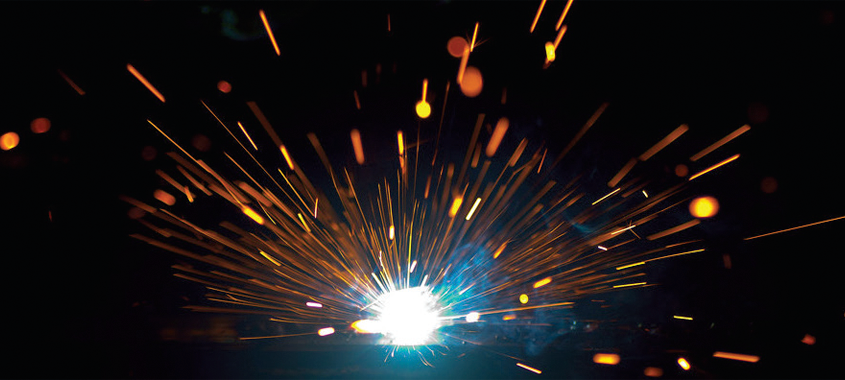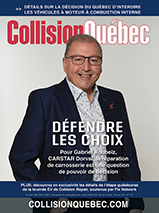READING COMPREHENSION
WELCOME TO REALITY—HOP ABOARD OR HOP OFF
By Stefano Liessi
Time flies when you are having fun—but it also seems to whiz by when we’re under pressure. I have been in this industry for 39 years and can admit that much of it is a blur. When I look back on the changes that have come to fruition in this time it is equivalent to standing at the bottom of a mountain looking up. Have I learned anything over those years, absolutely, do I know everything I need to know? Absolutely not. I am constantly learning new innovative ideas and tooling applications.
If you had told me at the beginning of my career that ‘computers’ were going to be a dominant component of the automotive collision repair industry, I would have laughed at you, made my way to the lunchroom, grabbed another coat hanger and continued to oxy acetylene braze in that patch on that ’79 Parisienne.
Moving forward to 2021 I am dining on some well-done crow, reading tech sheets, and looking up OEM information on my computer. The days of “heat ‘er up till she’s red” are long gone.
So, what do we do now? The answer: spend a considerable amount of time making sure that we are getting it right the first time by sourcing our Tech Advisor, AllData, and OEM literature. We are learning that every manufacturer has a different ideology with regards to what and how we repair, no longer is it a one slice does all.
Yet, as it has been over the decades, we just slowly morph these new approaches into our processes by osmosis and surprise. Nothing like learning something second hand six months later.
Even still, there are some that refuse to acknowledge the changes, fighting the new reality of our industry to the bitter end. There are some that get on every moving band wagon passing through town.
It is time to embrace change, but this all depends on a few factors: do you take pride in what you do every day? Are you genuinely concerned with doing the right repair to put the vehicle back to OE spec? Are you truly engaged with the idea of researching repair techniques and applying them? Yes, is the correct answer to all these questions, by the way. In general, the idea of procedural focus as applied to structural repair is new to our structural repair techniques. A lot of information that I gather is through articles and interactions in industry, so I decided to do some digging myself on how to go about gathering some firsthand knowledge as if I was an appraiser or technician in a shop.
I decided to delve into a 2017 Acura MDX hit on the left side rocker, which includes various layers of HSS and UHSS not to mention three different welding processes. I discovered all this information after spending well over an hour going through the OE procedures available on Tech Advisor, along with repairability matrix documents from I-CAR while creating an estimate on Mitchell. Was all the information systematically available in one location? No. Was I able to complete a full tear down and itemize everything in that time? No—I do not literally have a vehicle in my office. From this exercise alone it is evident that creating an estimate properly requires far more time than ever before. Welcome to 2021.
Now let us delve into the repair. As a technician, I now have a plethora of sheets loaded with technical information to read, averaging approximately 250 words/minute equates to approximately two minutes per page, now throw in the comprehension aspect—and double that time minimum. I found out that all plug welds on panels <1mm are a 6mm hole, 1mm – 1.5mm material requires plug weld holes of 8mm, material >1.5mm are 10mm holes. I also found out that weld through primer must be Zinc based (not copper), there are three different weld applications in the one procedure – MAG plug – STRSW- MIG braze. Oh my, it does not stop just there—oh no, no—how about the fact that some of these weld procedures have parameters as well, such as, all STRSW performed on 1180-1500mpa MUST be done using manual settings on you welder (not auto). Your MIG Brazing is done utilizing two strategically placed 8mm plug holes. Did I mention that Honda provides a list of 31 “welding conditions” that you use to set your STRSW for indicated welds, this application utilizes 4 of these “conditions”—of which, for this repair, you need to flip through multiple times.
Now, we also need to destructively test our welds, for each type of weld, Plug, Braze and Spot. Honda provides a formula to utilize in measuring the tear out. It is a mathematical formula involving square root, for those of you that said you would never need that new math. This means adding time and line items to the sheet for welder set up and destructive testing, not one line, but three as they all require different parameters to be met. If we don’t add these line items, we give a false image of the actual time to complete the repair process, skewing your KPIs —another modern day repair influencer for another article. Remember, even with all of this we have not even begun to dip into initializations, calibrations, DTCs, and specifics for ADAS modules. Not to mention measuring and documenting the process. This is only for one make, model, and year. This does not give you a one and done application, the research needs to be continuously done for each vehicle you are estimating regardless of make and model. Line items on your sheet to look this up? — you bet’cha.
This is our new repair world. How are you feeling now? Normally I conclude my columns with a statement that reads along the lines of “In my opinion, and you are entitled to my opinion” however, this tag line does not apply today. The information and ideologies I write about today are fact.
These points are not up for debate or negotiation by anyone, they are required to be understood, applied, documented, and accounted for during any repair by any person.
If you plan on repairing vehicles, then this is just the beginning of what is involved. If you are a repairer, estimator, owner, or insurer, you had better get on board as we are all still at the bottom of the mountain.




















